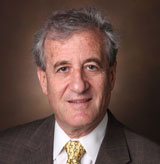The Precision Medicine Initiative is a national effort announced by President Obama during his State of the Union address to provide more effective treatment and prevention strategies for individuals by taking into account their unique genetic, environmental and lifestyle factors.
Achieving this goal will require the development of a comprehensive scientific knowledge base, including the launching of a national cohort study of a million or more Americans.
Last week, Vanderbilt University’s Joshua Denny, M.D., M.S., and Dan Roden, M.D., participated in a workshop hosted by the National Institutes of Health (NIH) to start to address how such the cohort will be built.

Denny, associate professor of Biomedical Informatics and Medicine, is an expert on electronic health records (EHRs). He gave a presentation on the subject at the workshop and contributed to a white paper on the opportunities and challenges of using EHR data in research.
Roden is the William Stokes Professor of Experimental Therapeutics and assistant vice chancellor for Personalized Medicine. He is internationally known for his contributions to the field of pharmacogenomics — how genetic variation affects individual responses to medication.
EHRs provide an essential “data resource” for correlating genomic and other sources of clinical information, including lab results and diagnostic images. In this way, they can help researchers determine what influences the development of disease.

EHR data can be inaccurate and lack organization, Denny cautioned. Many hospitals are actively adopting EHRs now, but there is little uniformity in the collection of data across health care systems. Predictions are 90% of hospitals will have some sort of EHRs by next year.
However, when combined with informatics techniques to process the data and a DNA biobank as is the case with Vanderbilt’s BioVU, the EHR can become a rich resource to study many diseases and drug responses.
EHR data can be quite dense, he said, with the average individual having hundreds of clinical notes and medication entries.
Launched in 2007, BioVU contains genetic material linked to EHR data from nearly 200,000 individuals. The biobank, which recently began to collect plasma, has enabled well over 50 studies by researchers seeking the genetic underpinnings of abnormal heart rhythms, Alzheimer’s disease, breast cancer and diabetes, to name a few.
To information gleaned from biobanks and EHRs, the national research cohort is also considering adding lifestyle data, such as calorie consumption and environmental exposures tracked through mobile health devices, such as FitBit or Jawbone.
Use of this type of data has not been tested against human health — by combining with clinical data from sources like EHRs, it would allow researchers to study the impact of the data collected from these devices on human disease.
The project is still unfolding and many details are yet to be worked out. One idea is that each voluntary participant could control how the information is used in research and shared.
In this way, the Precision Medicine Initiative will set up a new way of doing research that fosters open, responsible data sharing with the highest regard for the privacy of participants, government officials said.















